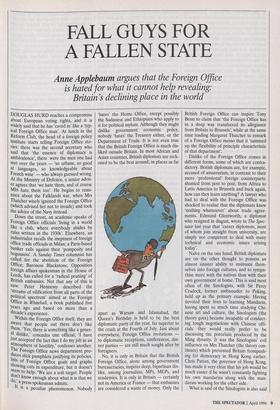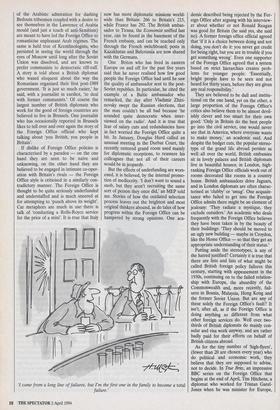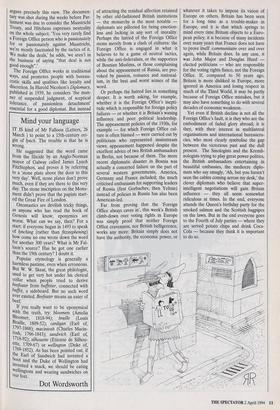FALL GUYS FOR A FALLEN STATE
Anne Applebaum argues that the Foreign Office is hated for what it cannot help revealing: Britain's declining place in the world
DOUGLAS HURD reaches a compromise about European voting rights, and it is widely said that he has 'caved in' like a 'typ- ical Foreign Office man'. At lunch in the Reform Club, the head of a foreign policy institute starts telling Foreign Office sto- ries: there was the second secretary who said that 'the essence of diplomacy is ambivalence', there were the men one had met over the years — 'so urbane, so good at languages, so knowledgeable about French wine' — who always guessed wrong. At the Ministry of Defence, a senior advis- er agrees that 'we hate them, and of course MI6 hate them too'. He begins to remi- nisce about the Falklands war, when Mrs Thatcher wisely ignored the Foreign Office (which advised her not to invade) and took the advice of the Navy instead.
Down the street, an academic speaks of Foreign Office officials 'living in a world like a club, where everybody abides by rules written in the 1930s'. Elsewhere, an industrialist recalls the ineptness of foreign Office trade officials in Milan; a Paris-based banker rails against their 'pomposity and bogusness'. A Sunday Times columnist has called for the abolition of the Foreign Office; Baroness Blackstone, Opposition foreign affairs spokesman in the House of Lords, has called for a 'radical pruning' of British embassies. Not that any of this is ,flew: Peter Hennessy described the streams of vilification from all parts of the Political spectrum' aimed at the Foreign Office in Whitehall, a book published five years ago and based on more than a decade's experience. Within the Foreign Office itself, they are aware that people out there don't like them. 'Yes, there is something like a gener- al dislike,' concedes one official; 'I have Just accepted the fact that I do my job in an atmosphere of hostility,' confesses another. The Foreign Office news department pro- _duces slick pamphlets justifying its policies, lists of Foreign Office goals and graphs showing cuts in expenditure, but it doesn't s_eem, to help: 'We are a soft target. People t know enough about what it is that we 00, a.press spokesman admits.
It is a peculiar phenomenon. Nobody 'hates' the Home Office, except possibly the Sudanese and Ethiopians who apply to it for political asylum. Although they might dislike government economic policy, nobody 'hates' the Treasury either, or the Department of Trade. It is not even true that the British Foreign Office is much dis- liked outside Britain. In most African and Asian countries, British diplomats are reck- oned to be the best around; in places as far apart as Warsaw and Islamabad, the Queen's Birthday is held to be the best diplomatic party of the year, far superior to the crush at the Fourth of July. Just about everywhere, Foreign Office invitations — to diplomatic receptions, conferences, din- ner parties — are still much sought after by foreigners. No, it is only in Britain that the British Foreign Office, alone among government bureaucracies, inspires deep, bipartisan dis- like, among journalists, MPs, MEPs, and academics. It is only in Britain — certainly not in America or France — that embassies are considered a waste of money. Only the British Foreign Office can inspire Tony Berm to claim that 'the Foreign Office has in a deep way transferred its allegiance from Britain to Brussels', while at the same time leading Margaret Thatcher to remark of a Foreign Office memo that it 'summed up the flexibility of principle characteristic of that department'.
Dislike of the Foreign Office comes in different forms, some of which are contra- dictory. British diplomats are, for example, accused of amateurism, in contrast to their more 'professional' foreign counterparts: shunted from post to post, from Africa to Latin America to Brussels and back again, how can they learn anything? A lawyer who had to deal with the Foreign Office was shocked to realise that the diplomats knew 'nothing whatsoever' about trade agree- ments. Edmund Glentworth, a diplomat who resigned in disgust, wrote in The Spec- tator last year that 'career diplomats, most of whom join straight from university, are simply not competent to deal with many technical and economic issues arising today'.
Naïve on the one hand, British diplomats are on the other thought to possess an almost sinister ability to insinuate them- selves into foreign cultures, and to sympa- thise more with the natives than with their own government at home. This is said most often of the Sinologists, with Sir Percy Cradock, former ambassador to Peking, held up as the primary example. Having devoted their lives to learning Mandarin, having spent so much time studying Chi- nese art and culture, the Sinologists (the theory goes) became incapable of conduct- ing tough negotiations with Chinese offi- cials: they would really prefer to be discussing the porcelain produced by the Ming dynasty. It was the Sinologists' evil influence on Mrs Thatcher (the theory con- tinues) which prevented Britain frompush- ing for democracy in Hong Kong earlier. Chris Patten, the governor of Hong Kong, has made it very clear that his job would be much easier if he wasn't constantly fighting his own mandarins along with the man- darins working for the other side.
What is said of the Sinologists is also said of the Arabists: admiration for dashing Bedouin tribesmen coupled with a desire to see themselves in the Lawrence of Arabia mould (and just a touch of anti-Semitism) are meant to have led the Foreign Office to romanticise unpleasant Arab regimes. The same is held true of Kremlinologists, who persisted in seeing the world through the eyes of Moscow until long after the Soviet Union was dissolved, and are known to prefer communists to democratic riff-raff. A story is told about a British diplomat who waxed eloquent about the way the Romanians organised their first post-1989 government. 'It is just so much easier,' he said, with a journalist in earshot, 'to deal with former communists.' Of course the largest number of British diplomats who work for the good of foreign countries are believed to live in Brussels. One journalist who has occasionally reported in Brussels likes to tell over and over again the story of the Foreign Office official who kept talking about 'you British, you people in Britain'.
If dislike of Foreign Office policies is characterised by a paradox — on the one hand they are seen to be naïve and unknowing, on the other hand they are believed to be engaged in intimate co-oper- ation with Britain's rivals — the Foreign Office style is criticised in a similarly con- tradictory manner. The Foreign Office is thought to be quite seriously underfunded and understaffed and is much sneered at for attempting to 'punch above its weight'. Car metaphors are much in use: there is talk of `conducting a Rolls-Royce service for the price of a mini'. It is true that Italy now has more diplomatic missions world- wide than Britain: 266 to Britain's 215, while France has 292. The British ambas- sador to Tirana, the Economist sniffed last year, can be found in the basement of the French embassy, and can be reached only through the French switchboard; posts in Kazakhstan and Belorussia are now shared with the Germans.
One Briton who has lived in eastern Europe on and off for the past five years said that he never realised how few good people the Foreign Office had until he saw the quality of ambassador sent to the post- Soviet republics. In particular, he cited the example of a Baltic ambassador who remarked, the day after Vladimir Zhiri- novsky swept the Russian elections, that the man couldn't be all bad because `he sounded quite democratic when inter- viewed on the radio'. And it is true that fear of salary cuts and redundancies have in fact worried the Foreign Office quite a bit. In January, Douglas Hurd called an unusual meeting in the Durbar Court, the recently restored grand room used mainly for diplomatic receptions, to reassure his colleagues that not all of their careers would be in jeopardy.
But the effects of underfunding are wors- ened, it is believed, by the internal promo- tion of mediocrity. 'I don't want to sound a snob, but they aren't recruiting the same sort of person they once did,' an MEP told me. Stories of how the outdated selection process leaves out the brightest and most original thinkers abound, as do tales Of how progress within the Foreign Office can be hampered by strong opinions. One aca- 'I come from a long line of failures, but I'm the first one in the family to become a total failure.' demic described being rejected by the For- eign Office after arguing with his interview- er about whether or not Ronald Reagan was good for Britain (he said yes, she said no). A former foreign office official agreed that `if it is a choice between doing and not doing, you don't do it: you never get credit for being right, but you are in trouble if you get something wrong'. Even one supporter of the Foreign Office agreed that a system based on strict hierarchies creates prob- lems for younger people: 'Essentially, bright people have to be seen and not heard for thirty years, before they are given any real responsibility.'
They are believed to be dull and institu- tional on the one hand, yet on the other, a large proportion of the Foreign Office's critics also believe them to be almost devil- ishly clever and too smart for their own good: 'Only in Britain do the best people go into the civil service, one would never see that in America, where everyone wants to make money,' an academic said. And despite the budget cuts, the popular stereo- type of the grand life abroad persists as well: all over the world, British embassies sit in lovely palaces and British diplomats live in beautiful houses; in London, high- ranking Foreign Office officials work out of rooms decorated like rooms in a country house. British ambassadors drive Jaguars, and in London diplomats are often charac- terised as 'clubby' or 'smug'. One acquain- tance who failed to get into the Foreign Office admits there might be an element of jealousy: 'They radiate a mystique, they exclude outsiders.' An academic who deals frequently with the Foreign Office believes they have been taken in by the beauty of their buildings: 'They should be moved to an ugly new building — maybe in Croydon, like the Home Office — so that they get an appropriate understanding of their status.'
Putting aside the stereotypes, is any of the hatred justified? Certainly it is true that there are lists and lists of what might be called British foreign policy failures this century, starting with appeasement in the 1930s, continuing on to the failed relation- ship with Europe, the absurdity of the Commonwealth and, more recently, fail- ures in Bosnia, Malaysia, Hong Kong and the former Soviet Union. But are any of these solely the Foreign Office's fault? It isn't, after all, as if the Foreign Office is doing anything so different from what other foreign services do. Well over two- thirds of British diplomats do mainly con- sular and visa work anyway, and are rather badly paid for their efforts on behalf of British citizens abroad.
As for the tiny number of 'high-flyers', (fewer than 20 are chosen every year) who do political and economic work, they believe that they are supposed to advise, not to decide. In True Brits, an impressive BBC series on the Foreign Office that begins at the end of April, Tim Hitchens, a diplomat who worked for Tristan Garel- Jones when he was minister for Europe, argues precisely this view. The documen- tary was shot during the weeks before Par- liament was due to consider the Maastricht Treaty, and Hitchens expresses neutrality on the whole subject: 'You very rarely find a Foreign Office person who is passionately for or passionately against Maastricht, we're mostly fascinated by the tactics of it. We make the deals,' he adds, 'we aren't in the business of saying "that deal is not good enough": The Foreign Office works in traditional ways, and promotes people with bureau- cratic skills and qualities like loyalty and discretion. In Harold Nicolson's Diplomacy, Published in 1939, he considers 'the man- ner of suspended judgment, of sceptical tolerance, of passionless detachment' essential for a good diplomat. But instead of attracting the residual affection retained by other old-fashioned British institutions — the monarchy is the most notable — diplomats are pilloried for being emotion- less and lacking in any sort of morality. Perhaps the hatred of the Foreign Office stems merely from a clash of cultures: the Foreign Office is engaged in what it believes to be a game of neutral tactics, while the anti-federalists, or the supporters of Bosnian Muslims, or those complaining about the appeasement of Russia, are pro- voked by passion, romance and national- ism, in the best and worst senses of the word.
Or perhaps the hatred lies in something deeper. It is worth asking, for example, whether it is the Foreign Office's inepti- tude which is responsible for foreign policy failures — or whether it is Britain's waning influence and poor political leadership. The appeasement policies of the 1930s, for example — for which Foreign Office cul- ture is often blamed — were carried out by politicians who represented mainstream views; appeasement happened despite the excellent advice of two British ambassadors in Berlin, not because of them. The more recent diplomatic disaster in Bosnia was actually a concerted failure on the part of several western governments, America, Germany and France included; the much criticised enthusiasm for supporting leaders of Russia (first Gorbachev, then Yeltsin) instead of policies in Russia has also been American-led.
Far from proving that the 'Foreign Office always caves in', this week's British climb-down over voting rights in Europe was simply proof that neither Foreign Office cravenness, nor British belligerence, works any more: Britain simply does not have the authority, the economic power, or whatever it takes to impose its vision of Europe on others. Britain has been seen for a long time as a trouble-maker in Europe, and it is that which springs to mind every time Britain objects to a Euro- pean policy; it is because of many incidents over many years that France does not have to prove itself communitaire over and over again, while Britain does. In any case, it was John Major and Douglas Hurd — elected politicians — who are responsible for the voting rights fiasco, not the Foreign Office. If, compared to 50 years ago, Britain is more disliked in Europe, more ignored in America and losing respect in much of the Third World, it may be partly because of Foreign Office mistakes, but it may also have something to do with several decades of economic weakness.
Yet even if British decline is not all the Foreign Office's fault, it is they who are the embodiment of faded glory abroad; it is they, with their interest in multilateral organisations and international bureaucra- cies, who most clearly symbolise the gap between the victorious past and the dull present. The Sinologists and the ICremli- nologists trying to play great power politics, the British ambassadors entertaining in beautiful embassies, the mediocre diplo- mats who say smugly, `Ah, but you haven't seen the cables coming across my desk,' the clever diplomats who believe that super- intelligent negotiations will gain Britain influence — they all seem somewhat ridiculous at times. In the end, everyone attends the Queen's birthday party for the smoked salmon and the Scottish bagpipes on the lawn. But in the end everyone goes to the Fourth of July parties — where they are served potato chips and drink Coca- Cola — because they think it is important to do so.




























































 Previous page
Previous page